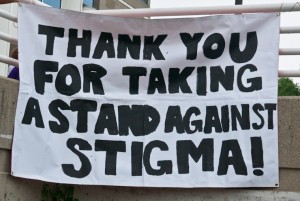In my 15 years of working with mental illness, I see how unwelcoming society can be towards people who live with these disabilities. Sometimes the mental illness stigma is overt, like a potential employer choosing a candidate without a disability over a qualified person who has one. Other times, it’s more subtle, such as someone using unkind language. My clients’ families also feel the burden of a society that can be too quick to judge. Families hide the fact they have a loved one struggling, and clients downplay their symptoms and challenges in order to be accepted.
 The Surgeon General explains that stigma “deprives people of their dignity and interferes with their full participation in society.” I see this time and again with my clients, as they struggle to find jobs, a welcoming community, friends and simple social outlets. My team works hard to help our clients achieve the highest possible quality of life. But that’s not enough. We, as a community, need to step up to help reduce the stigma around mental illness.
The Surgeon General explains that stigma “deprives people of their dignity and interferes with their full participation in society.” I see this time and again with my clients, as they struggle to find jobs, a welcoming community, friends and simple social outlets. My team works hard to help our clients achieve the highest possible quality of life. But that’s not enough. We, as a community, need to step up to help reduce the stigma around mental illness.
How can we reduce stigma, allow for hope and support recovery?
Put mental health front and center.
We can bring this issue to the forefront of the community’s awareness by offering education and direct contact with people who have behavioral health conditions.
Choose our words with care.
To reduce the mental illness stigma, we need to be constantly aware of how we talk about behavioral health. We know it is not politically correct to call someone retarded, yet it is still common to use words like crazy, psycho, lunatic, etc. These words can be just as offensive and harmful.
Treat the illness as an illness.
Mental illness should be treated similarly to physical illness. When someone acts differently when they are going through cancer treatment or even sick with the flu, we don’t blame them for getting tired easily or being more short-tempered than usual. Can you imagine asking someone with the flu to “snap out of it,” or asking a person with a broken bone to “try harder”? Yet these insensitive statements are made frequently to people who suffer from mental illness.
Learning how to respectfully discuss mental health issues allows for open and honest conversation. This is a major step in fighting mental illness stigma. The guidelines in TED’s article “How Should We Talk About Mental Health” are a great starting point to reducing the discomfort in speaking about mental health.
Openly acknowledging our role in fighting stigma is a good step. The National Alliance on Mental Illness asks individuals, companies and organizations to take the StigmaFree Pledge. Are you willing to listen, understand and perhaps even share your own story?
JFS is excited to be hosting NAMI Family-to-Family, a 12-week class for adult family and friends of people living with mental illness. Class starts March 16 and is facilitated by Rabbi Dov Gartenberg and Farrell Adrian.
 By Rachael Kwong
By Rachael Kwong
Rachael is the Director of SAJD Supported Living Program where she strives to ensure a high level of independence and quality of life for the people she serves. When not at JFS, she spends her time running, being a mother and learning how to garden with a toddler.
Photo by Steven Depolo.



